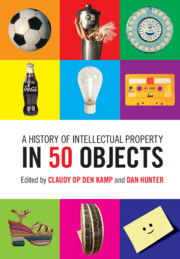Book contents
- Frontmatter
- Dedication
- Contents
- Acknowledgments
- Introduction: Of People, Places, and Parlance
- The Pre-Modern Period
- The Age of invention
- Modern Times
- 18 Player Piano Roll
- 19 Champagne
- 20 Steamboat Willie
- 21 PH-Lamp
- 22 Climbing Rose
- 23 Penguin Paperback
- 24 Ferragamo Wedge
- 25 Aspirin Pill
- The Consumption Age
- The Digital Now
- About The Contributors
23 - Penguin Paperback
from Modern Times
Published online by Cambridge University Press: 12 June 2019
- Frontmatter
- Dedication
- Contents
- Acknowledgments
- Introduction: Of People, Places, and Parlance
- The Pre-Modern Period
- The Age of invention
- Modern Times
- 18 Player Piano Roll
- 19 Champagne
- 20 Steamboat Willie
- 21 PH-Lamp
- 22 Climbing Rose
- 23 Penguin Paperback
- 24 Ferragamo Wedge
- 25 Aspirin Pill
- The Consumption Age
- The Digital Now
- About The Contributors
Summary
THE PENGUIN PAPERBACK is an icon of Publishing and design. The first covers were attractively simple. A rectangular shape, 181 X 112 mm, adhering to the golden ratio of 1.61 and based on work by Leonardo da Vinci on the ideal page size. Friendly bands of orange, white, and orange—like the map of an imaginary European country, tilted on its side. The words “Penguin Books” in a stylish escutcheon. And most recognizable of all, the cheerful, irreverent Penguin logo.
How recognizable? In 1987 militants kidnapped Terry Waite in Beirut. Years of solitary confinement followed. When Waite asked his captors for a book, he decided the best way to transcend language barriers, and the best way to ensure he received something decent to read, was to draw the Penguin logo.
Now part of the global Penguin Random group, and with thriving subsidiaries in Europe, China, India, the Americas, and Australia, Penguin Books is the world's best-known publishing imprint. Its rise to proniinence and profitability was anything but inevitable; but in attaining both ends, it transformed the way that the public read, and the way that publishers use the intellectual property system.
Like many famous brands, Penguin sprang from humble and precarious circumstances. In the early 1930s, three brothers— Allen, Richard, andJohn Lane—were working at their family firm, The Bodley Head. At the end of the 19th century, that firm had published groundbreaking and somewhat-scandalous books in London and New York. By the time of the Great Depression, however, the imprint was somewhat crusty—and on the way to bankruptcy.
The Lane brothers needed a lifeline. In the 1930s, atypical, new hardcover volume cost seven shillings and sixpence, a price that made them an unaffordable luxury for many readers. The brothers decided to launch a new venture from within The Bodley Head: a series of paperbacks that would sell at the remarkably low price of sixpence.
The brothers launched the series with an initial tranche of ten titles. The sourcing of the ten texts was a key part of what made the new venture innovative. The Lanes negotiated with rival publishers to sub-lease the paperback rights for titles that had previously appeared in hardcover. Of the first ten titles, six came fromJonathan Cape, one from Chatto & Windus, one from Benn, and the remaining two from The Bodley Head.
- Type
- Chapter
- Information
- A History of Intellectual Property in 50 Objects , pp. 192 - 199Publisher: Cambridge University PressPrint publication year: 2019



